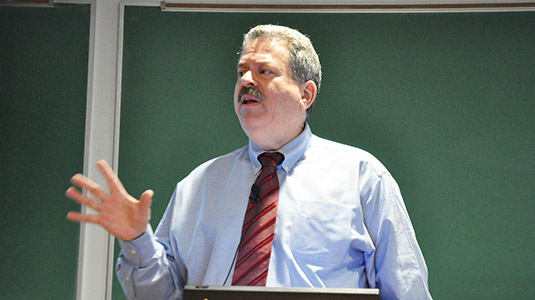IBM Chief Innovation Officer Bernard Meyerson on ‘Driving Innovation’
“Innovation is core to the companies who reinvent themselves,” Meyerson says

Watch a video of Meyerson's talk.
When we think about innovation, we tend to think big ideas and “a-ha” moments. But real innovation often happens slowly, with small improvements made over time.
“Never undervalue ongoing innovation, the guys who come into work every day and make things 10 percent better,” IBM Chief Innovation Officer Bernard Meyerson told a standing-room-only crowd of McCormick students on April 23.
In his role at IBM, Meyerson leads the creation of collaborative initiatives with companies and governments around the globe — from helping oil companies better predict pipeline maintenance needs to developing artificial intelligence tools that could help doctors diagnose patients. He shared insight into his work with a talk, ““Driving Innovation in a Global Enterprise,” part of the McCormick School of Engineering’s Dean’s Seminar Series.
Meyerson urged students to look beyond “a-ha” moments and instead strive to develop work environments that breed creativity. That includes collaborating across disciplines and building diverse teams who can bring varying viewpoints to the table. “What I do is a team sport,” Meyerson said. “Nobody’s that good (on their own).”
Being prepared for the technology of tomorrow also requires specific skills, Meyerson said — especially the ability to make sense of complex information. “Data is the new oil,” he said, and to understand it we need a new tool: analytics, the science of extrapolating valuable insights from data.
Integrating analytics tools with real-world data opens up great possibilities for improving lives, Meyerson said, enabling problem-solvers to be proactive instead of reactive.
For instance, analytics now makes it possible to predict the flow of traffic, including slowdowns and traffic jams. Armed with that information, governments can intervene and actually prevent traffic problems by taking measures to try to steer traffic in the desired flow or to keep cars off the road at peak hours. Meyerson pointed to Singapore, where an “Electronic Road Pricing” scheme has been adopted to manage traffic through toll prices and other measures.
Big data offers endless possibilities, he said, and with that comes great responsibility: The IT industry and its partners must use these tools to enable solutions for a smarter planet.
“We are predicting the future and changing it for the better,” Meyerson said.
You can view Bernard Meyerson's presentation here.